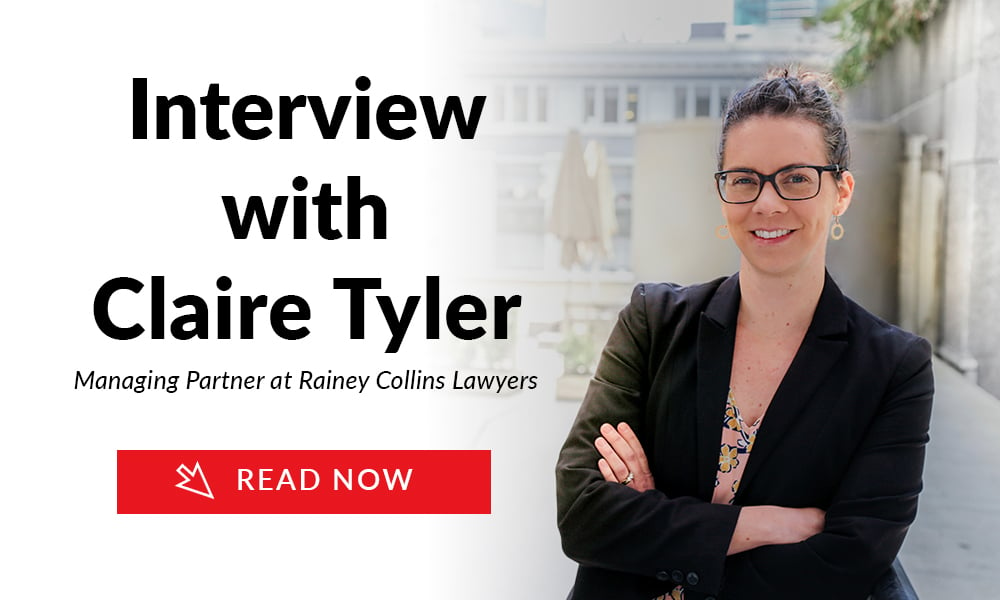
The legal industry is evolving fast—here's how smarter tools and AI are changing the way lawyers practice

For Claire Tyler, managing partner at Rainey Collins, the legal industry is a landscape of tradition – but also, an exciting frontier of technological transformation.
With nearly two decades of experience specialising in property and commercial law, Tyler has built a career around providing pragmatic advice to her clients. Over the years, her interest in how technology can enhance legal practice has grown, particularly as tools like artificial intelligence (AI) and digital workflows have become increasingly central to how law firms operate.
“When I started in property law, they’d just phased out paper transfers where people used to physically walk them to the Land Transfer Office,” Tyler tells NZ Lawyer. “Now of course, everything is done electronically – we push a button, and the titles are transferred within a day.”
The evolution from manual to digital has transformed the profession in profound ways—but Tyler sees this as only the beginning. With advanced AI tools and automated systems now emerging, she believes the legal industry is standing on the brink of another major shift, one that could redefine how lawyers manage their time, interact with clients, and approach complex matters.
Tyler has kept a watchful eye on how legal technology has evolved over the decades, and Rainey Collins has already embraced a number of enhancements. The firm already uses software to collect information on client enquiries – something she says saves a lot of time.
“This is where some of our ‘triaging’ tools have come in really useful,” she explains. “The software collects details from the client, asks follow-up questions, and helps us assess whether we can assist and what the next steps might be.” By automating this initial stage, the firm can focus its time and resources on adding real value.
Tyler is also enthusiastic about the progression of AI-driven research tools, like Lexis® Argument Analyser. By absorbing vast amounts of information and coming back with the most relevant points, these tools have the potential to significantly cut down on hours spent by clerks and junior lawyers on research.
For Tyler, these tools exemplify the next stage in legal technology: smarter, more targeted solutions that don’t just make processes faster, but also elevate the quality of legal work.
“I’ve already seen a trial of Lexis® Argument Analyser being put to use on one of our matters where it was able to give us a contrary view, which is what we wanted,” she explains. “It’s not just about making things easier – it’s about helping us see angles or details that we might not have noticed otherwise.”
Technology has undoubtedly transformed the legal profession, but Tyler notes that it has also brought challenges to lawyers – particularly around stress levels and accessibility. The speed and immediacy of modern communication have fundamentally changed how lawyers work, and how clients engage with their legal advisers.
“We used to open letters first thing in the morning, and people wouldn’t expect a response until days later,” Tyler recalls. “There’s definitely a lot more immediacy to what happens now.”
While this shift has improved responsiveness and client satisfaction, it has also increased the pressure on lawyers. Being ‘away from your desk’ is no longer a valid reason for not being accessible, and everything is treated with more urgency.
“This heightened pace means lawyers need to be especially mindful of setting realistic expectations for their clients—and for themselves,” Tyler says.
Addressing inefficiencies in non-billable time has been one of Tyler’s strategies for managing this new reality. She notes that Rainey Collins has always recorded and kept a close eye on what non-billable time is being spent on. That helps the firm to work out where the inefficiencies are, and what other resources it can use to help re-allocate those tasks.
Time management tools also play a crucial role in maximising productivity.
“There are many time-recording systems and tools already available out there, and that’s something I think lawyers should embrace more,” Tyler says. “It’ll allow them to get as much as possible out of their daily hours, and will help them work out where any ‘wasted’ hours are.”
Tyler says AI, like all technology, when well applied has the capacity to reduce large amounts of time spent on files. Tyler comments that she is interested in the effect that this will have on pricing, especially for many firms who price work based on time spent only.
Even as Rainey Collins incorporates advanced tools into its operations, Tyler is clear that technology should never replace the personal connection between lawyer and client. “Ultimately, the lawyer’s job is to keep up a relationship of trust and confidence,” she emphasises.
“The technology allows us to get all of the background in front of us so that we can properly consider it against the client’s actual situation. We’re really looking forward to tools like Lexis+ and having the full suite of legal AI technology. It’s been so exciting to look ahead and see what the technology is going to be capable of.”
Lexis® Argument Analyser enables legal professionals to prepare stronger case arguments in minutes. Learn more and Book Your Free Demo by clicking HERE.
Lexis+® is an online legal research tool powered by extractive AI, that saves time and helps you deliver better client outcomes. Book your free demo HERE.